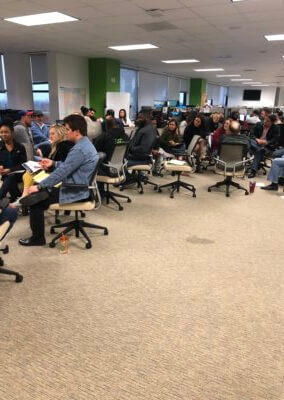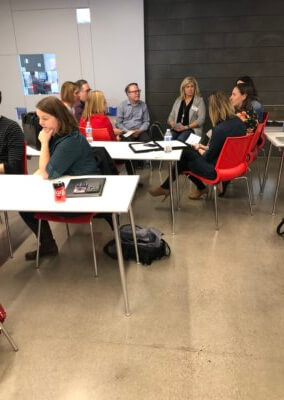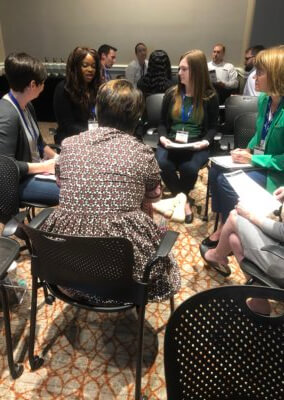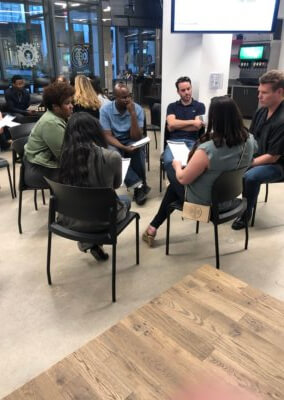Thank you for purchasing Cards Against Mundanity playing cards!
The instructions and FAQ are listed below. If you have any additional questions, please feel free to reach out to me and/or if you are interested in having me conduct this as a workshop.
Lack of trust causes more organizational issues that anything else. It’s the #1 cause of poor teamwork and performance.
Here’s why…
Every employee, manager and leader asks themselves these two questions when engaging with any person:
1) Do I trust you?
2) If yes to #1, then do I have “extreme” trust with you? (You know that if on a scale of 1-5 for trust, you’d pick a 5.)
Very few employees can answer yes to both 1 and 2.
Data shows that if an individual merely agrees that they trust another employee, manager or leader, they show the same level of engagement as someone who actively distrusts the individual. So “extreme” trust is the benchmark. You either have it or you underperform.
Cards Against Mundanity builds extreme trust in minutes. It’s based on more than four years of research and interviewing more than 1000 leaders, managers, influencers, experts and employees. It’s based on a famous research study where in 45 minutes 30% of the participants created the closest relationships in their lives with complete strangers!
The key to breaking the trust building curve is vulnerable sharing in groups. You shorten the cycle to build close relationships from 200 to 400 hours to minutes.
More than 12000+ employees are using them to increase performance, teamwork, communication, resolve conflicts, increase sales, build better customer relationships, and much more.
It’s the ultimate team building and performance game.
It’s also the cornerstone for an organization’s people or human capital strategy.
It’s being used in leading companies such as Amazon, Southwest Airlines, Ernst & Young, Google, Gillette, Microsoft, Oracle, Blue Cross Blue Shield, Worldwide Express, CareHere, Oklahoma City Thunder (NBA team), Houghton Mifflin Harcourt, Novartis, Merck, Intel, Thermo Fisher Scientific, and many others.
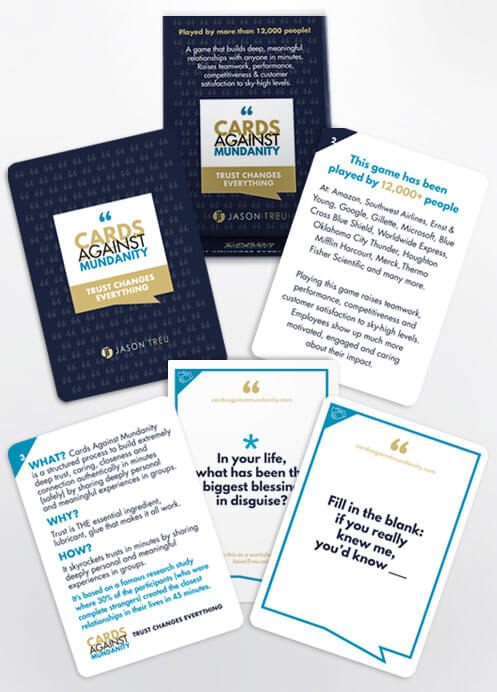
Cards Against Mundanity Overview and Instructions
“Trust is the one thing that changes everything.” – STEPHEN M.R. COVEY
All the greatest teams have one thing in common – extremely high levels of trust, caring, and connection that brings out the absolute best in each person. It enables teams and organizations to accomplish seemingly impossible feats together.
Why? Trust is THE essential ingredient, lubricant, glue that brings together an organization business strategy and people strategy. It’s the key to high performance.
Cards Against Mundanity is a structured process to build extremely deep trust, caring, closeness and connection authentically in minutes (safely) by sharing deeply personal and meaningful experiences in groups.
What’s the benefit? It’s a scientific approach to maximize performance, engagement, teamwork, communication, problem-solving and innovation in any size company and any industry.
How does it do that? It skyrockets trusts to the highest level in minutes (versus a decade) by sharing deeply personal, meaningful experiences in groups. 99% of teams never accomplish what this process can do. It’s your competitive advantage.
It’s based on a famous research study where 30% of the participants (who were complete strangers) created the closest relationships in their lives in 45 minutes.
It’s not just limited to teams/organizations. Individuals can use this to accelerate their career success. It can also be used with third parties such as customers, prospects, and partners to close deals faster, upsell more, etc.
I also conduct an onsite workshop and assisted, remote workshop (starting at $797) (jasontreu.com/team-building-workshop) that teach leaders, managers, and employees how to use the strategies, processes, and game to maximize performance, teamwork, and much more.
What is it? It’s a group question-and-answer game where everyone answers the same questions (i.e. everyone in the group answers question #1, then #2, etc.). It can be played with one other person or groups up to 10 people.
With groups over 10 people, break them into groups of 4-8 people. You can have unlimited number of groups play this at the same time (up to thousands in the same room or virtually).
Types of questions: There are two types questions: conversation starters and connection questions (deeper, more vulnerable questions). Connection questions are what skyrockets trust. Recommend using 10% conversation starters and 90% connection questions.
What settings? It can be used in teams, working groups, coworkers, 3rd parties (customers, prospects, partners, etc.) events, company off-sites, company meetings, board meetings, hiring, employee orientation, resolving conflicts, etc. You can do it in person, via video, and on the phone.
How many questions:
- You can use one or more questions or play a full game (ideally 8-15 questions)
- If you only have time for one or two questions, pick “praise” or “uplifting” questions such as “who is your personal hero?” or “what are you most grateful for?”. It will get people motivated, energized and leave them wanting to engage more.
Choosing questions:
- [For a full game] You have two options: First, pick one conversation question to start and then move to the connection questions. Second, preselect the questions for the group.
- [For one or two questions] Pick them out ahead of time. This would be for things such as getting to know your manager (or any leader better), customers/prospects, investors, board members, other employees 1:1, etc.
Quick Start Instructions:
- One person (volunteers) to start and answers the first question. Caveat: the most senior level person in the group must go first.
- The person to their right answers the same question. Continue until everyone in the group answers that question.
- Then go onto the next question. The person to the right of the person who answered the first question now picks a question and answers it. Continue the same process.
- Maximum of two minutes per person/per question.
- Optional Final Question: [If playing in a group] Each person has one minute to say 1-2 things they learned and how they can apply it in their job/role/team.
Want me to pick out your questions? Here are questions I regularly use with teams.
- What’s the most important lesson you’ve learned in the last year?
- If you were to say thank you to one person for helping you become the person that you are today, who would it be and what did they do?
- In your life, what’s been the biggest blessing in disguise?
- What’s the biggest hurdle you’ve overcome in the last five years?
- What’s your biggest regret in the last five years and what did you learn from it?
- What’s your greatest achievement and how has it shaped you?
FAQ
What if my team and/organization is very large in the hundreds or 10000s (and global)?
- The results accrue across the entire group playing. They don’t have to be in the same team. It works very well with global teams and virtual/distributed teams. You can conduct it simultaneously with people all over!
What if I manage a team, but my organization isn’t on board yet and/or doesn’t buy into this way of thinking?
- It will work. It doesn’t matter if others buy into it or not. The ONLY thing you will have to do is reinforce the concepts here on a more regular basis than an organizational-wide implementation. I’d recommend doing things every 60 days or less. They can be exercises that are 10-15 minutes in duration.
What if I’m an individual contributor?
- It will help you. You can pitch to your manager to use. You can use it 1:1 with colleagues, your manager, any external parties you interact with, etc.
How would I use this with external partners/audiences?
- I’ll use a sales example. For a prospect, you’d play a couple questions at the end. You could say something like, “I really get to know the people I work with. I have a fun game that’s similar to Cards Against Humanity, but for the workplace. Want to try a few questions?” You can do the same thing with current clients, either in a group or 1:1. You’ll see results after only 5-10 minutes. And they typically don’t want to stop playing either.
What if people don’t want to share and open up?
- I put in questions called “Conversation Starters.” They are fun, light and easy questions. People rarely use them. As long as the leader (or first person playing) picks the “Connection Question” everyone continues to play with them.
How long before I see results?
- You’ll start to see results immediately. It’s also dependent on “you” the manager/leader to create the conditions for people to thrive, and incorporate the values I share in the video/PPT.
In today’s litigious environment, do you see problems or push back with individuals when they play Cards Against Mundanity? Do you see people using the information people share against each other?
- I’m not a lawyer, and I’m not offering any legal advice. Please seek out in-house counsel and/or attorney for legal advice or any questions you may have. In my experiences, I’ve never had anyone push back or use the information against someone else.
How can I bring up playing this game to someone I work with?
- “I want to build a better working relationship with you. It will help both us. The only way we can do that is to get to know each other better. I came across this question-and-answer game that would be fun to play. You up for it?”
- They will say yes. Everyone likes to play games. Plus, you also have research and ROI data you can share.
As the team leader, how can I roll this out to my group?
- I think sharing why you believe this important is a critical step. They will be able to use the information strategically in their interactions. I think a five minute explanation is plenty.
- You can share my TEDx talk, “How to Get CoWorkers to Like Each Other.”
- You have all the materials, research and videos as well. You can also share Google’s research on Project Aristotle.
Can I use this for a team-offsite, company meeting, conference, ice-breaker, etc.?
- Yes! You don’t need to give people information on the game. You can just play it. The results will be fantastic.
How do I follow this up?
- I’d recommend doing additional activities every three months. It can be an activity that takes 5-10 minutes. You must prioritize and institutionalize the core principles I share in your team and/or organization.
- If you are an individual contributor, you can come up with ways to get people to share. You’ll be able to customize the information here to do that.

